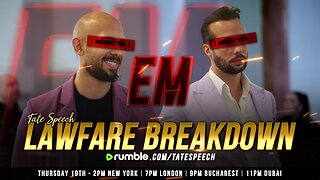Premium Only Content

"He's a Character!" Featuring Nikki Lee.
Ex East 17 Singer Brian Harvey's Remarks: Conspiracies, Accusations, and Online Trolls.
Brian Harvey, the former lead singer of the '90s boy band East 17, has recently made bold and controversial claims involving high-profile figures and theorised conspiracies. One of his latest statements targeted independent commentator and online personality Matthew Taylor. In a video shared by Harvey, he remarked:
"All the other trolls, even back then appeared to be putting the boot into him, like what they are today, you know or, and he takes it a bit too well for it to be real."
This comment is worth analysing in the broader context of Harvey's recent assertions, which have raised eyebrows for their sweeping implications and seemingly speculative nature.
The Claims Against Matthew Taylor.
Harvey's mention of Taylor wasn't limited to a casual observation. He suggested that Taylor, who gained attention in 2013–2014 for his politically charged "Matt Taylor for Prime Minister" videos, might be involved in a larger scheme, alleging that Taylor's ability to withstand criticism without breaking was suspicious. Harvey went as far as to associate Taylor with Ian Puddick, a well-known figure involved in various conspiracy theories and legal battles, implying that Taylor's presence and reactions were orchestrated as part of a covert operation.
Taylor, however, has dismissed such claims, emphasising that his resilience to online criticism stems from two main factors: the unsubstantiated nature of the accusations and his own inner strength. "Nothing said about me is factually true," Taylor remarked, underscoring the baseless nature of the vitriol aimed his way. Moreover, Taylor has built a reputation as someone who can maintain composure under pressure, reflecting a well-developed capacity for resilience rather than any hidden agenda.
Paranoia and a Pattern of Accusation.
Harvey's distrust isn't limited to Taylor. In an even more explosive claim, he has suggested that One Direction member Liam Payne was murdered by the music industry, driven by a desire for profit. This assertion, dramatic and unsubstantiated, adds to a growing list of allegations Harvey has made that indicate a belief in far-reaching conspiracies within powerful circles.
READ MORE - Former East 17 Singer Brian Harvey Claims Liam Payne's Death Was a Murder Plot by Record Company.
https://x.com/KingArthurII2/status/1848656331818844518
Such statements paint a picture of a man grappling with suspicion and a need to expose hidden truths. However, they also highlight a recurring theme: a lack of critical thinking and reliance on speculative connections. Harvey’s tendency to intertwine unrelated events and figures in conspiratorial narratives can make it difficult to separate legitimate concerns from unfounded paranoia.
The Reality Behind Online Abuse.
Harvey’s theory that Taylor’s unyielding response to online abuse is evidence of complicity reflects a misunderstanding of the nature of resilience. The digital landscape, particularly for independent voices like Taylor, can be ruthless. However, handling negative commentary with poise isn’t indicative of a larger plot; it speaks to personal fortitude and a conscious choice not to be defined by baseless criticism.
Taylor's story is a reminder that public figures, even those who are not part of mainstream media, develop strategies for enduring online trolling. For Taylor, navigating relentless online attacks has become second nature. He has consistently engaged with his audience on platforms like his WordPress site and YouTube channel, MattTaylorTV, turning interactions into content without faltering under pressure.
The Bigger Picture.
While Harvey’s comments reflect a deeply ingrained mistrust of institutions and public figures, they also serve as a cautionary tale of how scepticism, when unchecked, can morph into baseless accusations. The digital age, rife with rumours and speculation, makes it easier for such narratives to gain traction without proof. Harvey’s allegations against Taylor and the broader conspiracy theories he entertains show the dangers of conflating resilience with complicity and questioning everything without grounding beliefs in verifiable facts.
In conclusion, Matthew Taylor is not part of any conspiracy. His ability to withstand online abuse stems from a combination of inner strength and the understanding that most of the attacks directed at him lack factual substance. The lesson from this saga is twofold: genuine resilience can be misconstrued by those looking for patterns, and, more importantly, while questioning authority can be healthy, losing the balance between scepticism and evidence can lead to a clouded sense of reality.
-
 LIVE
LIVE
Akademiks
43 minutes agoJay Z War against Diddy Accuser Lawyer GOES CRAZY! Lil Baby Speaks OUT! Cardi v Offset? Bhad Bhabie?
3,203 watching -
 37:54
37:54
Kimberly Guilfoyle
4 hours agoAmerica is Healing, Plus Fani Willis Disqualified, Live with Shemane Nugent & Mike Davis | Ep. 182
52.4K18 -
 7:38
7:38
Game On!
2 hours agoThe picks you need for Thursday Night Football!
74 -
 1:58:28
1:58:28
Redacted News
3 hours agoBREAKING! Elon Musk DESTROYS spending bill, Ron Paul pushes to make him Speaker | Redacted News
96.4K191 -
 51:06
51:06
VSiNLive
2 hours agoCollege Football Playoff & Bowl Game Best Bets! | VSiN College Football Betting Podcast LIVE
16.5K1 -
 1:34:33
1:34:33
Candace Show Podcast
3 hours agoHow We Faked The Moon Landing With Bart Sibrel | Candace Ep 124
37.4K115 -
 DVR
DVR
Scammer Payback
2 hours agoCalling Scammers Live
12.5K3 -
 1:01:07
1:01:07
In The Litter Box w/ Jewels & Catturd
23 hours agoVOX POPULI, VOX DEI | In the Litter Box w/ Jewels & Catturd – Ep. 709 – 12/19/2024
76.5K27 -
 22:54
22:54
Stephen Gardner
4 hours ago🔥JUST NOW: Trump JUST SHOCKED GOP with new DEMAND!!
52.6K33 -
 1:23:22
1:23:22
Tate Speech by Andrew Tate
5 hours agoEMERGENCY MEETING EPISODE 96 - LAWFARE BREAKDOWN
177K125